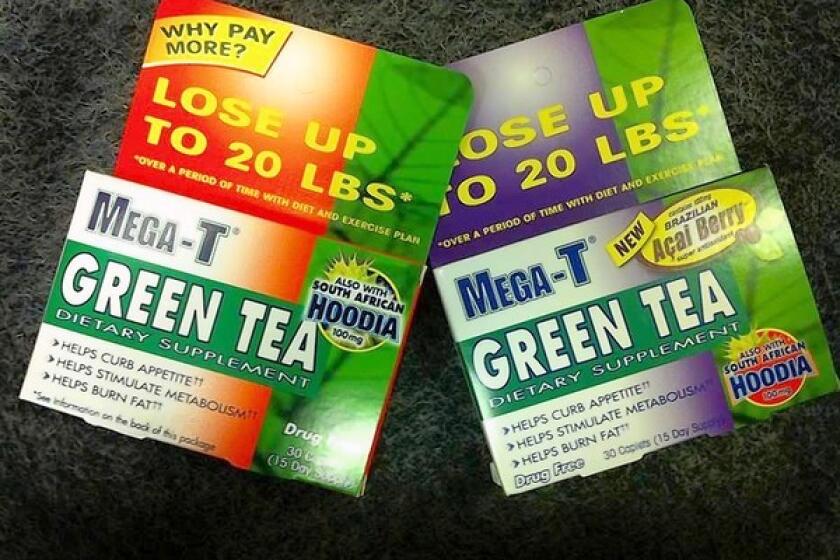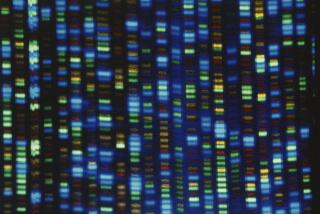Column: Why spend billions for Ancestry’s DNA data if you don’t plan to use it?
- Share via
Shirley Ruge has long been fascinated with exploring her family tree. At one time, that meant many hours spent combing through records at courthouses and libraries.
For the last 20 years or so, the Indian Wells resident has focused her research on Ancestry (a.k.a. Ancestry.com), one of the leading sites for genealogical sleuthing and DNA analysis. The company says it has 18 million people in “the world’s largest consumer DNA network.”
“You find heroes in your past and you also find villains,” Ruge, 87, told me. “It’s fascinating.
“I’m one of six kids,” she said. “I want to know where we come from, and why we’re all so different.”
Lately, though, Ruge has had other questions on her mind.
Such as: Why was Utah-based Ancestry purchased in December by the New York investment firm Blackstone Group for $4.7 billion?
And: What does Blackstone plan to do with that treasure trove of genetic data, which is highly sought after by drug companies, insurance firms, employers and others?
“I don’t believe for a second that Blackstone bought Ancestry simply because they love people,” Ruge said. “You don’t spend $4.7 billion unless you have a plan to make it back, and more.”
Blackstone says she and others needn’t worry.
“We invested in Ancestry because it is a clear leader in its industry with a digital subscription business that has continued to grow significantly,” said Matt Anderson, a spokesman for the investment firm with more than $600 billion in assets under management.
“Blackstone has not and will not access user DNA and family tree data, and we will not be sharing this data with our other companies,” he told me. “To be crystal clear, doing so was never part of our investment thesis — period.”
End of story? Perhaps not.
I reached out to a number of bioethicists to ask if they believed Ancestry users could rest easy knowing their genetic data will remain under wraps. Nearly every one of them scoffed at the idea.
California’s insurance commissioner estimates average pandemic refunds to stuck-at-home drivers were about half what they should have been.
“That’s utter nonsense,” said Arthur Caplan, a professor of bioethics at New York University. “I don’t believe it for a second.”
“Users of direct-to-consumer genetics products should always remember that they are voluntarily giving their DNA to a company whose goal is to make money from that DNA,” observed Laura Rivard, a biology professor at the University of San Diego.
Amy Lynn McGuire, a professor of biomedical ethics at Baylor College of Medicine, said that regardless of what Blackstone says now, “that could change with changes in leadership and as new business opportunities present.”
It’s naive to think Blackstone would spend almost $5 billion for an asset it has no plans to exploit, said Ellen W. Clayton, a professor of law and health policy at Vanderbilt University. “Why else would they buy it?” she asked.
Again, Blackstone says it aims to recoup that huge investment through Ancestry’s subscription fees, which run from $25 to $50 a month.
But nearly every expert I spoke with cited the partnership announced in 2018 between Ancestry rival 23andMe and pharmaceutical giant GlaxoSmithKline.
Glaxo purchased a $300-million stake in 23andMe, giving it access to the genetic data of the company’s 12 million users.
The genealogical site GEDmatch, which played a role in catching the Golden State Killer, was acquired in 2019 by San Diego’s Verogen, a company with links to crime labs.
“It’s important to understand that, at some point, the purpose of all these DNA companies is to monetize that data,” said Katherine Drabiak, an associate professor of public health at the University of South Florida.
“The entire business model is offering a service people want and amassing a huge amount of data,” she said. Ancestry’s new owner ignoring the value of its genetic database “would fly in the face of how these companies operate.”
Dietary supplements require no upfront approvals for safety or effectiveness — despite repeated incidents involving questionable products.
Gina Spatafore, an Ancestry spokeswoman, said the company “does not sell or share customer DNA data with insurers, employers or third-party marketers.”
“Ancestry’s commitment to these robust consumer privacy and data protections remains unchanged under our new ownership,” she said.
The company’s privacy policy makes similar declarations.
But deep within the text I found a provision that says Ancestry reserves the right to use people’s genetic information for “scientific” research, which is vague enough, and broad enough, to cover any number of possible scenarios, such as collaborating with drug researchers.
The company also claims a right to use people’s DNA for “building new products and services, including services related to personal health and wellness.”
Blackstone holds stakes in nearly 100 companies, including insurers, drugmakers and research labs. Bloomberg found language in the company’s regulatory filings indicating it plans to “package and sell data” from companies it acquires to develop new sources of revenue.
Blackstone’s Anderson told me this disclosure “does not apply to our flagship private equity funds through which we invested in Ancestry.”
Which is to say, yes, the company plans to mine data from its various holdings but, no, not in Ancestry’s case.
To which the experts I spoke with responded with healthy skepticism.
“The money with companies like Ancestry is in the database,” said New York University’s Caplan. “A savvy company like Blackstone knows that.”
He and other bioethicists were quick to note that existing federal medical privacy laws don’t apply to genealogical sites. These companies are basically free to do as they please with people’s genetic data.
“A lot of these sites are a bait and switch,” Caplan said. “They offer some interesting content, but what they’re really after is your DNA.”
Everyone’s stuck at home because of the pandemic. Our cable and internet connections are our lifelines. So of course fees are going up again.
So take the industry’s assurances of genetic privacy with a grain of salt. These companies operate largely in the shadows and are limited in their activities almost solely by the honor system.
Blackstone’s website touts the firm’s extensive partnerships with “the pharmaceutical, biotechnology and medical technology industries,” and a focus on developing new drugs “with the lowest clinical risk and the highest probability of success.”
I’m with Ruge. Spending $4.7 billion for Ancestry and its massive database of genetic information only makes sense financially if you plan to make use of that info.
Blackstone says it will make its money back by selling lots of new subscriptions.
Both Ancestry and 23andMe laid off employees last year amid slumping demand for home DNA tests.
More to Read
Inside the business of entertainment
The Wide Shot brings you news, analysis and insights on everything from streaming wars to production — and what it all means for the future.
You may occasionally receive promotional content from the Los Angeles Times.













